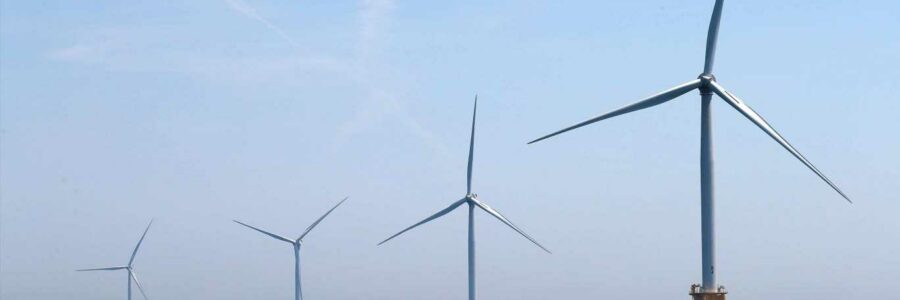
Construction starts at America's first major offshore wind farm
- It represents the latest step forward for America's fledgling offshore wind sector.
- While the U.S. is home to a well-developed onshore wind industry, its first offshore wind facility, the 30 MW Block Island Wind Farm, only started commercial operations in late 2016.
In this article
- GE
- IBE-ES
- AGR
Ground has been broken on a project dubbed the United States' "first commercial scale offshore wind farm."
The construction's kickoff, which took place on Thursday, represents another step forward for America's fledgling offshore wind sector. Located in waters 15 miles off Martha's Vineyard, near Cape Cod in Massachusetts, it's hoped that the 800-megawatt Vineyard Wind 1 facility will start sending power to the grid in 2023.
Vineyard Wind 1 is being built by Vineyard Wind LLC, a 50-50 joint venture between Copenhagen Infrastructure Partners and Avangrid Renewables. The latter is a subsidiary of Avangrid, which is 81.5% owned by Iberdrola, a major utility headquartered in Spain.
According to Vineyard Wind, Covell's Beach in Barnstable is "the site where two cables will make landfall and connect to the grid at a substation further inland on Cape Cod." The wind farm will use 62 of General Electric's huge Haliade-X turbines, producing electricity for over 400,000 homes and businesses in Massachusetts, it says.
Read more about clean energy from CNBC Pro
Batteries are the 'new oil' says Morgan Stanley — Here are stocks for every part of the supply chain
Want in on the electric vehicle boom? This battery ETF is up 100% this year
Goldman says to buy these 4 chip stocks ahead of a green investing boom
The project is expected to cut carbon emissions by over 1.6 million metric tons annually. This represents the equivalent of removing 325,000 cars off the road every year, Vineyard Wind said.
"The US offshore wind industry holds tremendous promise for both job creation and reducing carbon pollution, and today's ground breaking, while historic, is just the first of many steps the industry will take as it grows," Christian T. Skakkebæk, who is senior partner and co-founder of Copenhagen Infrastructure Partners, said.
"CIP is excited to be a part of this first project, and we look forward to continuing to invest in and build out the offshore wind industry in the United States," Skakkebæk said.
Elsewhere, Kathleen Theoharides, Massachusetts' Energy and Environmental Affairs secretary, said that "the start of onshore construction for the Vineyard Wind project marks the beginning of a historic new chapter for this industry in the United States."
More from CNBC Climate:
Read more about how businesses and consumers are fighting and adapting to climate change:
China’s shock climate deal with the U.S. sparks some cautious optimism
‘You can’t live in a swamp’: Virginia fishing village threatened by rising sea levels
Rivian customers who pre-ordered electric SUVs and trucks made millions from IPO pop
While the U.S. is home to a well-developed onshore wind industry, the country's first offshore wind facility, the 30 MW Block Island Wind Farm, only started commercial operations in late 2016.
In March 2021, the Departments of Energy, Interior and Commerce said they wanted to roll out 30 gigawatts of offshore wind by the year 2030, a move it's hoped will generate thousands of jobs and unlock billions of dollars in investment.
Despite these plans, the U.S. still has a long way to go before it catches up with more mature offshore wind markets such as the one found in Europe.
Last year, the sector there attracted 26.3 billion euros (around $29.7 billion) of financing for new offshore wind projects, according to figures from WindEurope. In 2020, 2.9 GW of offshore wind capacity was installed in Europe, the industry body says.
While the U.S. is looking to ramp up its offshore wind capacity, the challenge of moving away from fossil fuels is a huge one. Just this week, the U.S. held an auction for oil and gas drilling in the Gulf of Mexico.
President Joe Biden had signed an executive order in January directing the Secretary of the Interior to halt new oil and natural gas leases on public lands and waters and to begin a thorough review of existing permits for fossil fuel development.
But in June, a federal judge in Louisiana issued a preliminary injunction to block the administration's suspension and ordered that plans continue for lease sales that were delayed for the Gulf and Alaska waters.
The U.S. Department of Justice is asking an appeals court to overturn the judge's order.
—CNBC's Emma Newburger contributed to this report
Source: Read Full Article